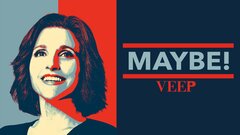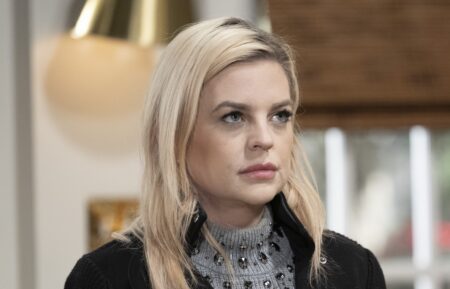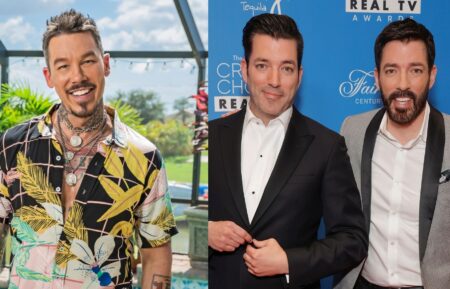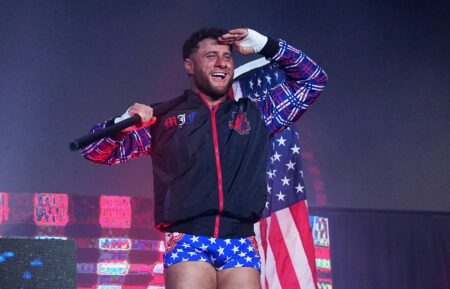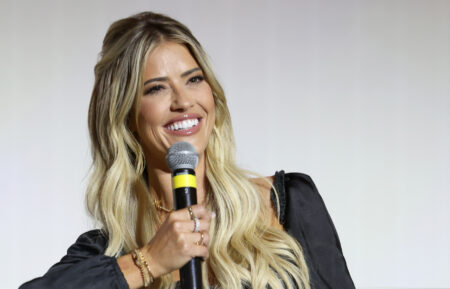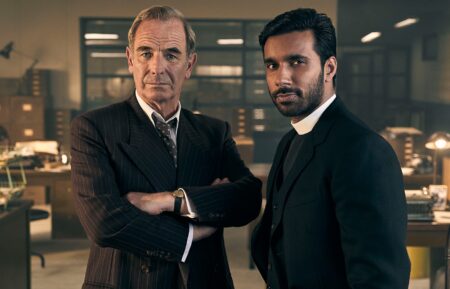‘Veep’ Boss David Mandel on the Season 5 Finale and a New Direction for Selina Meyer
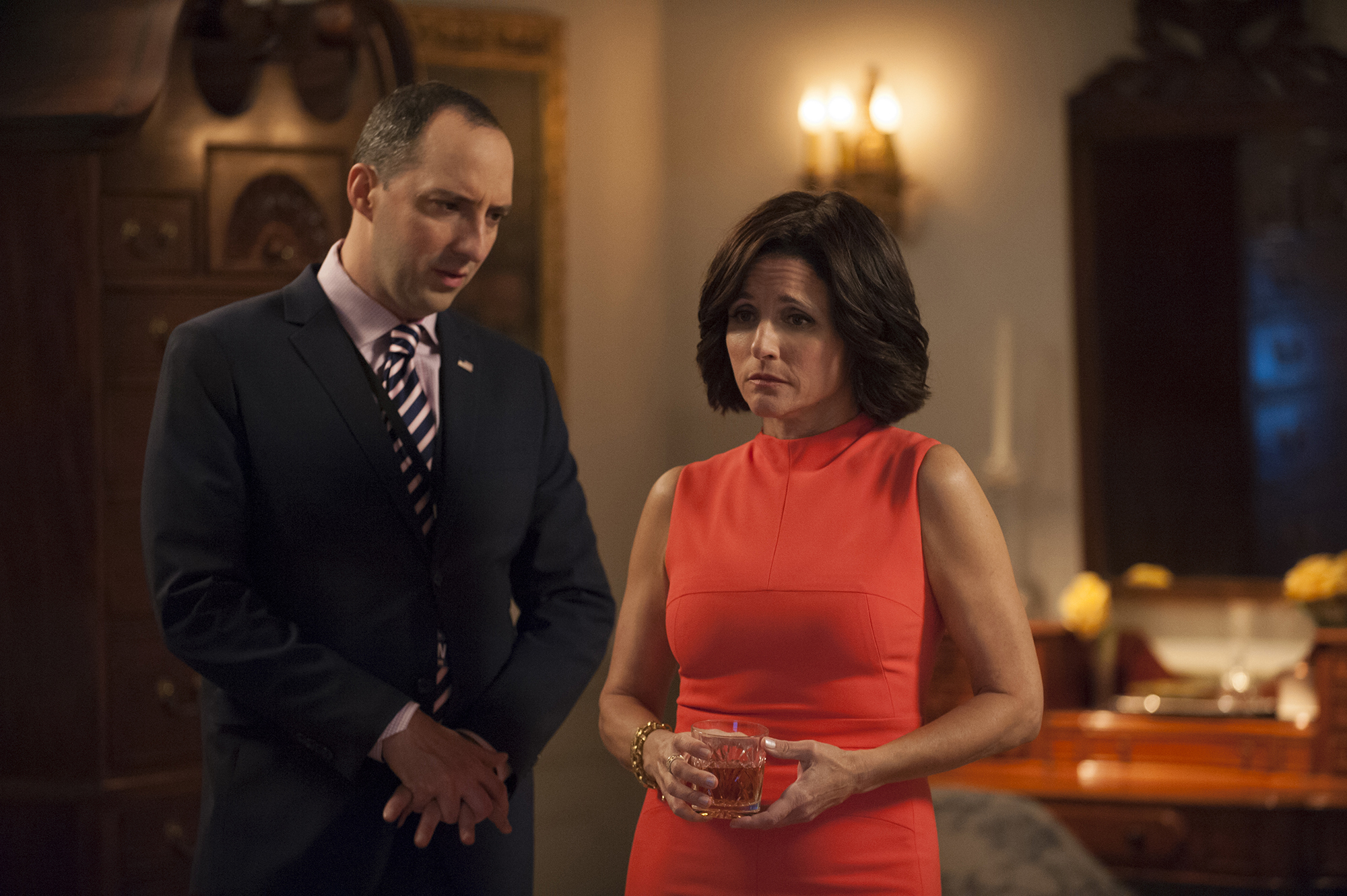
Warning: Spoilers for the Season 5 finale of Veep ahead.
When David Mandel, veteran of Seinfeld and Curb Your Enthusiasm, took over Veep from the show’s creator Armando Iannucci before this season, there was a fear that without Iannucci’s voice, the show would suffer. But Mandel has led the show through one of its strongest and most creative seasons yet, taking President Selina Meyer (Julia Louis-Dreyfus) through the constitutional torture of deciding between her and her electoral opponent after an Election Day tie. We’ve not only seen shades of Selina that we never knew existed, including the depths of her awfulness as a person, we’ve seen new shades of everyone on the staff.
But in a twist, Selina ends the season not only out of the Oval Office but out of Washington, with the Hail Mary chance of her being VP to her running mate Tom James (Hugh Laurie) scuttled by senatorial deal making. So, how will the show deal with a Selina Meyer who’s on the outside looking in? TV Insider spoke to Mandel about that, and about how he preserved the show’s profane voice while putting his own stamp on things.
RELATED: Veep’s Anna Chlumsky on Season 5, Crazy Hollywood Moments and Returning to Showbiz
You guys are back in the writers’ room already for Season 6?
Yep, today’s the first day. For me, last season proved to be more work than I thought it would be [Laughs]. I don’t mean it to sound stupid, but there’s a density to the scripts and how much story it packs in; it just fills the days. It meant not a lot of editing during the season, so the editing went longer than I ever expected. But it’s given me some perspective on what worked and what didn’t work, so I feel that going into the next season, as many things that are plot-wise as up in the air in some was as they were when I took over for Armando, I feel like I have a better grip on the reins [Laughs].
You took a left turn at the end of the finale. Was the intention to make people believe Selina is so power-hungry that she’d take the VP job even though she didn’t want to do it again?
For me, one of the most interesting things in the finale, character-wise, was that we knew at the end of Episode 9 that Selina would no longer be the president. And cry as she might that she’d never take the vice presidency, that Mike staked his reputation on the fact that she’d never take the vice presidency, when push came to shove, she was ready to take the vice presidency, even as horrible as Tom James was to her. Even in that last election loss with the Senate voting, you forget for a second that this wasn’t about her becoming the president, this was about Tom James becoming the president. She’s losing the vice presidency, a job she didn’t even want.
It’s at that moment that she truly realizes she’s out of it, in a way that was even beyond losing the presidency. I think it speaks to her being the creature she is that the vice presidency, a job that she knew was so horrible, that she hated and didn’t want, she was clinging to it with every ounce of her being. That’s part of what makes her so fascinating.
Just like with the negotiations with the Chinese where she says she’ll be a co-president…
Much in the way she’s lying to the Chinese, she’s lying to herself [Laughs].
Tom can’t even get through that speech to Selina about being a part of the team without laughing.
Yeah, even he knows that, she’s not going to be a partner, she’s going to be the vice president for reasons that are going to be politically expedient for him, and also on some weird, four-year-old boy “I love you so I’m going to punch you” kind of a thing, he wanted her near him in some weird way. But she is unable to let go; she can’t imagine a world where somehow she isn’t a player. I’ll springboard off of that to say that’s what the future holds for us; now that she has none of these things, how is she relevant, how does she justify her existence? How is she going to do it herself? How does someone that craves all of that move forward? And that’s the exciting part to me.
Is that going to be the focus of Season 6 for you guys?
That’ll be the start; certainly, when I get of this call and go in and start talking to the writers that’s what we’re going to be talking about. She wants to be in the hall of power, she wants to be close to it. What can she do in her post-presidency to make herself relevant so people are still talking about her, for lack of a better term.
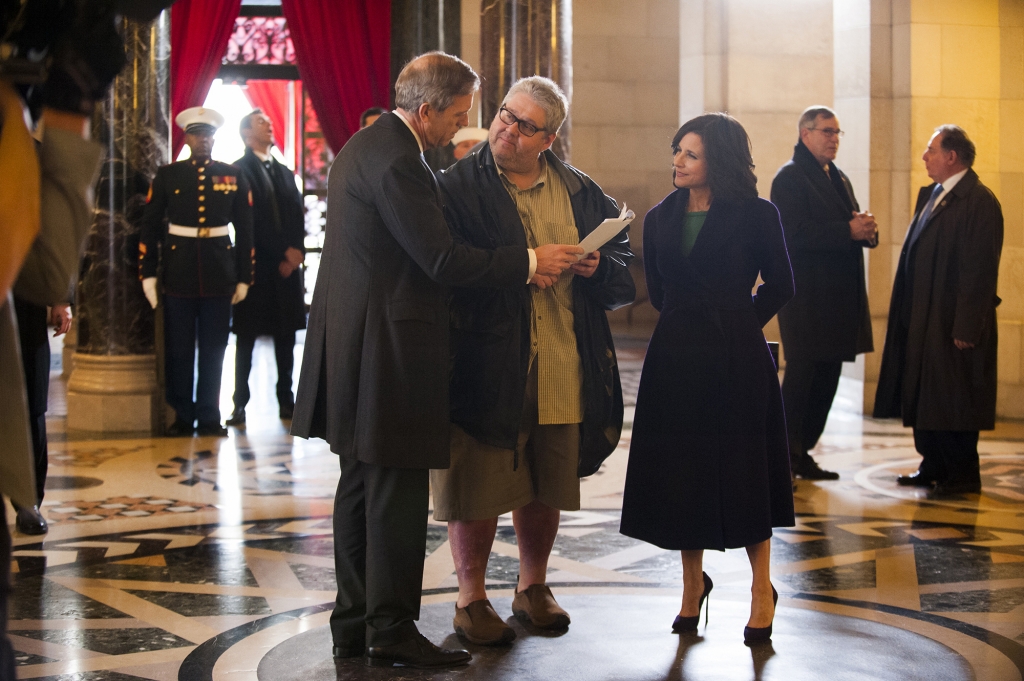
David Mandel (center) with Hugh Laurie and Julia Louis-Dreyfus
How did you guys come up with a complicated joke like line about the “grassy knoll full of Jodie Foster fans in the first row”?
We had it originally about a schoolbook depository, and then we realized we had done a schoolbook repository reference in Episode 3 about the Eagle (Martin Mull). So we were trying to think of something to replace it with. And “grassy knoll” … There are certain words that come out of Julia’s mouth really funny. Something about that double-s in “grassy” and the oddness of the word “knoll” … I hope she doesn’t hate me for saying this, but “grassy knoll” is a good Seinfeld phrase, it’s a good Julia phrase. It just is.
Armando had set things up where these lines had a particular structure to them, especially the dirty ones; they’re complicated. Did you have to think about that when writing, that “This sounds like a Veep line?”
Yes, and I will say that it was the hardest part, in a weird way, of the job, in the sense that I didn’t want to do the pale version of it. Not the [dirty] language, I didn’t want to do the weird Xerox or the carbon copy. I wanted the lines to be funny unto themselves without it seeming like I’m trying hard to do exactly what Armando did with the language. There are aspects of things that are perhaps not as elaborate with some of our insults but reflect an aspect of my personality. For instance, something like “I told him to go f–k a bag of glass,” [Laughs] that’s a phrase for whatever reason I’ve used in my personal life. The language is a little bit different, but it’s a little bit the same. The notion of a complicated show with a lot of speaking parts, that I was used to. With the language, that was something that took a couple of tries to get right. At the end of the day, I wanted to take what Armando created and at least try to put a little of my imprint on it. Had I not, I think people would have noticed.
All of the episodes this season gave new insight into the different characters, like in “C—gate,” we see a paranoid side of Selina we’ve never seen before.
One of the things we talked about from the beginning of the season was the pressures of this tie and what it would be doing to her psyche, and that’s what you saw. I think it was throughout the season, but that’s where you really saw it hitting home. In a wonderful way, that happened around the midpoint, Episode 6, where they thought they’d win Nevada, and that distracted them for awhile, and now she’s really in the middle of this and the walls are really moving in, and the paranoia is really coming forth. It was a side of her we hadn’t gotten to see before, the dark side of the presidency, if you will.
But we also see more about everyone: Dan (Reid Scott), Mike (Matt Walsh), Amy (Anna Chlumsky), etc.
Part of it was coming to the show as a fan I wanted to know these things, but also when you hit the fifth season of a show, it has to grow a little bit. Again, I don’t know what Armando would have done had he stayed, but I’d like to think he would have, much like his Season 4 is different from his Season 3, I think he would have expanded the show a little bit to give you a little more. I just think you have to; you have to keep it fresh.
When you write a finale that blows things up like that, do you ever pause and think about it or do you relish the challenge of it?
When I think about the season, I think of the end, where are we trying to get to. So these are sort of the ideas I had when I took the job and was told about the tie. My first thought was that she needs to lose the presidency because that was the one thing she wanted more than life itself. Then my second thought was, who was the worst person she could lose the presidency to, and that was a more competent, younger woman. This is what we were building to; I knew that was going to be the end of Episode 10. I didn’t know she was going to lose at the end of [Episode] 9, but I knew that ultimately, this is where we were getting to.
Along the way, we took in how sad and different it was, but it’s what got us excited. There’s a real similarity to — it sounds like a silly joke– if I left now and somebody else took over, they’re kind of in the same position Armando left me in [Laughs]. I think that sets Veep and some of the other shows [like it] apart is that, if you took the jokes out, there’s a really good political story going on. There’s an actual soap opera, or whatever you want to call it, buried within our big, big comedy. That drama allows these great comedic moments. We could have done more of “She’s the vice president or the president and she’s f–king things up,” I guess, but you really need these whatever you want to call them, these walls that we’re forced to figure out how to get over them and around them that creates the drama that creates situations that really allow the comedy to get good. That’s my theory on it, I guess.
RELATED: HBO Renews Game of Thrones, Veep and Silicon Valley
Also there’s going to be the dynamic switching between Selina and her daughter Catherine, especially at the very end of the finale, where Catherine is looking as glamorous as her mother for the first time.
I’m really excited that you noticed that. There’s been a real evolution watching Catherine’s growth this season, finding her fulfilled and in a relationship and downright happy, having the ability to question her mother’s hair [like in the finale]. I don’t think even a year ago, the old Catherine could have done that. That’s the stuff that I’m most proud of is how much these characters changed over the season, and I think that’s what we’ll continue to do. Just look at where they started and where they ended; those things from the very end will be the building blocks of where we’re starting: Sue is working for [President] Montez, is Amy in a relationship, Dan’s maybe going to have a media job, Jonah is a congressman. These are all shockingly different things, and Selina is not president. That’s kinda what goes into the soup pot.
And there’s a good chance we’ll follow everyone next year?
We have a giant cast plus a giant extended cast. We always try to service them all, and we manage to do that. But if you look back on this season, you’ll see that there was an evolution in the storytelling, where very often there were two worlds. There was the White House and Nevada, then the White House and New Hampshire. Those stories were connected to the overall plot, but they ultimately existed in their own worlds. Even in the finale, Jonah’s story of the interns and whatnot kind of existed on its own, with Richard (Sam Richardson) and a little bit of [Senator] Furlong (Dan Bakkedahl), and whatnot. But I do think the story structure of the show has changed a bit, and I think it’ll continue to evolve. Will we have episodes where we follow ten different stories? No, but the challenge will be how we group these people together in new and interesting combinations that make people laugh. Like at the beginning of the season, Richard was in charge of Jonah, which is a situation you had never seen before, but it took us to new, funny places. The challenge is how to fit it all in 28 minutes and 30 seconds [Laughs].
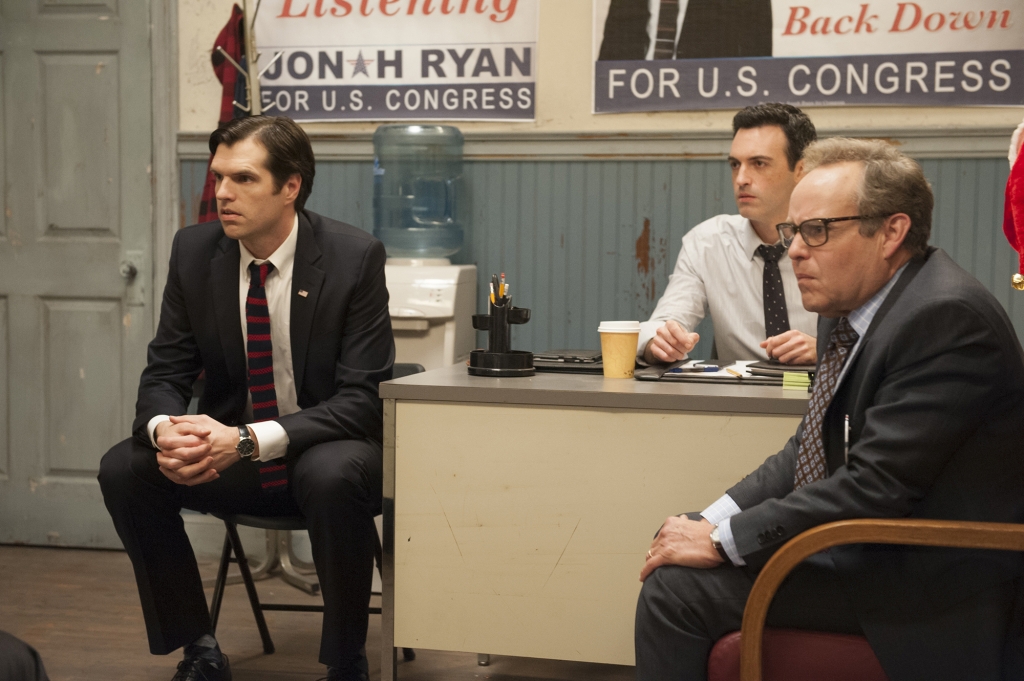
Tim Simons as Jonah, Reid Scott as Dan and Peter MacNichol as Jeff
As funny as Jonah is, seeing Peter MacNichol scream at him through the second half of the season as his stepfather and New Hampshire political player was hilarious. Did you realize he could get so profane?
What a wonderful revelation. I’m a huge Peter MacNichol fan; this will likely embarrass him, but I’m talking a Dragonslayer fan of Peter MacNichol. Knew he was a skilled actor, but I couldn’t tell you that he’d be perfect as the guy to scream at Jonah. But as a theater actor, I think he has a real love of language, and even though it seems like just screaming, he kind of embraces the poetry of the insult, if you will, and it just came second nature to him. He’s just so willing to jump in and have fun. I’ve said jokingly that we brought him in for one, maybe two [episodes], and we just can’t enough of the guy, know what I mean? [Laughs]
Also, the visual of him and Timothy Simons is irresistible.
Yeah, tall guy/short guy, that’s a classic. Legally, we either had to cast a very short guy or a very fat guy opposite Tim, so one or the other.
Martin Mull as the Eagle is still rattling around the White House, and he drops a bit of info about the Nevada ballots to President Montez at the end of the episode. There anything to that?
That’s as broad as we ever get, the Martin Mull thing, and I admit I’m a sucker for it, like showing up at [Selina’s mother’s] funeral and saying “Congratulations.” This to me was the extension of that. I do want to make clear — and I admit, it never occurred to me [that I’d have to] — there’s clearly a certain level of senility there, calling [President Montez] “Selina” and whatnot. In my mind, what he assumes are the ballots are index cards he found in his desk. In a million years — and I did notice one or two people going “oh, that could be it”… that’s not “it”. There are no ballots, Selina’s not the president. He’s a senile old eagle. And [Mull] is wonderful; we did like seven or eight variations of things, like one where he was talking about making Hawaii a state, one where he thought [Montez] was Nixon .. We did a bunch of variations of different kinds of craziness. This is the one that made us laugh. But that ain’t the twist that’s coming, I’ll simply say [Laughs].
And the fact that it seems like Sue’s been at the White House longer than anyone thought, will you explore that more, especially now that she’s with the next administration.
I think ultimately, it’s more his creation, dare I say. I never thought of it that way [the connection between the Eagle’s memory and the fact that Sue stayed on], but again the key there is: consider the source.
When you conceived of the documentary episode “Kissing Your Sister,” did you think about planning this early to get the additional shots?
We should have done what you just said, but we did not. It wasn’t really even finalizing what we wanted to hit upon until it was shot. It was the last episode we shot, so we were working on it during the finale to some extent. Except for a few of the “Catherine, get out” kind of shots, everything was recreated. A lot of the discussion was, what are the scenes we wanted to open up, what are the scenes we didn’t see, what else was going on, like the plot to fire Mike and things of that nature. There were extensions, like how did Tom James react when he found out he was going to be the financial czar, and all these moments where we wanted to expand upon, and we literally had to recreate them.
As the showrunner, how much more difficult were the logistics than a normal episode?
Production-wise, it was a bear, just the sheer number of sets. Just to do something like the [Richard starring in the] Mikado joke, that’s 20 seconds of screen time, but within that, we were lucky that Randall Park popped in as Chung, though we don’t tell you he’s there, but the makeup, the costumes, the choreography, the stage and sets, and yet it’s a 20-second gag. So extrapolate that. We talked about documentaries we liked, and discussed it with our DP, and as the director I talked a lot to our A-camera operator to move differently than a Veep episode, with a lot of push-ins and pull-outs that we don’t usually do, and the DP added elements of a slightly washed-out, consumer-grade camera, things of that nature. We really felt like you had to believe, after the HBO logo [ID], that you were seeing something different. It really looks and feels like her documentary, right up through the end credits.
Has Armando gotten in touch with you about the season?
He’s sent a couple of lovely e-mails, and he’s tweeted about how much he likes the show, which blew me away. He’s been nothing but supportive.
How did you have Matt Walsh carrying that 6-year-old in that Baby Bjorn?
It was a specially rigged Baby Bjorn that sort of had it’s own sub-harness. We also allowed him to relax between takes [Laughs]. That’s one of those examples when you write something into the script and then you get to see a lot of smart people get to work on it, and all of a sudden he’s holding this adorable giant girl, and you can’t not laugh. My wife is a pediatrician and has seen foreign adoptions, and age is a big issue. We did the joke early on, I think in Episode 1, where Mike said, before he lost the adoption, that she’s either 16 months or 3 years old. I’m a sucker for paying things off, so that’s a long one. That’s a 10-episode payoff [Laughs].
Will Jonah continue to be the failing upwards guy?
One of the questions I got over and over at the beginning of the season was, “Who’s our Trump? What’s our Trump character?” I said that there isn’t, there wasn’t there was never going to be. We don’t do parody. But in a funny weird way, and completely unplanned, Jonah in a weird way, has become our Donald Trump character. Not in a billionaire way, and not in the hair way, but our comment on the candidates in the political process, I’ll just leave it at that [Laughs].
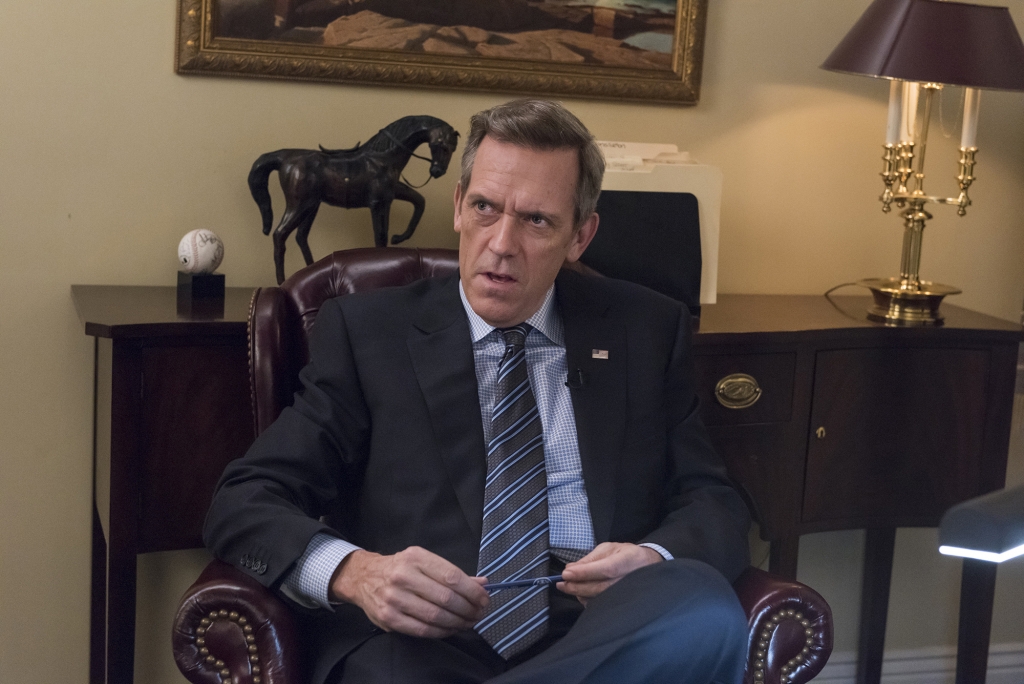
Hugh Laurie as Tom James
Any more Hugh Laurie as Tom James?
For the moment, their story feels done. But they’re two characters who, in an alternate universe, needed each other more than they ever realized. You never say no, but I’d want to do it for a reason.
Do you cringe at statements that this election is just as ridiculous as Veep?
The process, the language and level of discourse, makes our job harder. It used to be unique that we had politicians who said “f–k,” now we have debates on the size of hands vs. penis size. It’s harder to find satire when things are funny unto themselves. The fact that that we’re in the center of this insane election is a good thing for our show; it makes us feel more relevant, more a part of it, in a way, than any of the seasons ever before. It’s on people’s minds, people want to talk about politics. People forget that we wrote things last June, and if something happens in April, it’s not our commentary on it, it’s just an odd funny coincidence.

